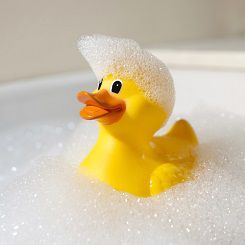Whether it’s a strictly utilitarian space or a carefully decorated and designed oasis where you unwind in a bath after a long day, your bathroom is one of the most important rooms in your home. What you may not realize, however, is that it can also be one of the most dangerous. There are several things that can pose safety risks in your bathroom, and most homeowners aren’t even aware of the hazard. These are ten of the most common hidden dangers present in bathrooms, and ways that you can restore your restroom to a relative level of safety.
- Bath Toys – A cheerful rubber ducky bobbing gently on the waves of your little one’s evening bath evokes idyllic childhood images, but it may also be teeming with mold and mildew. Bath toys retain water, sometimes even after being drained and stored properly. Making a point of cleaning bath toys thoroughly at least once each week can keep the worst of these microscopic boogeymen at bay.
- Slippery Surfaces – The stylish tile flooring in your bathroom may be the height-of-fashion fixture that pulls the room together, but it can also pose a very real falling risk when the surface becomes wet and slippery. The bottom of a bathtub can be similarly treacherous, so consider installing bath mats and coarse adhesives to keep your bathroom safe.
- Mold – Mold can be particularly irritating to those with respiratory issues, but can wreak havoc with the entire family’s health if it’s of the black mold variety. Be sure that you’re checking hidden areas for signs of mold, as the moist, warm environment of the bathroom is the perfect incubator for growth.
- Cosmetics – The same substances that add a dash of color to wan cheeks and cover up imperfections can be harboring nasty bacterial growth, especially if it’s old or shared by more than one person. Never share eyeliner, mascara or eyeshadow, and make a point of tossing anything that’s more than six months old or is beginning to smell different.
- Shared Towels – Cutting down on laundry is an attractive prospect, but the convenience pales in the face of the dangers of sharing towels. Jock itch, yeast overgrowth and other nasty microbes can flourish in a warm, damp towel, spreading infections throughout the family. Make sure that every member of the family has their own towel, and that it’s being washed regularly.
- Flushing With the Toilet Lid Open – Closing the toilet lid before flushing may seem like a stretch when you’re struggling to get the boys in the family to lift the lid before using the facilities, but it’s an important safety precaution. Flushing sends tiny particles of toilet water hurtling around the room, coating nearby surfaces with bacteria like e. Coli.
- Bacteria-Laden Shower Heads – You may think that your shower head is one of the cleanest fixtures in your restroom. After all, it’s the delivery method for the same clean, clear water that you use for cleansing your own body. In fact, shower heads can harbor mold, mildew and bacterial growth, so it’s wise to make a point of cleaning it regularly.
- Medications – It’s no secret that medications can be dangerous for kids that inadvertently overdose on them or mistake them for candy, but they can also be a hidden danger for adults if they’re expired, in the wrong container or subjected to moisture. Add a full inventory of medications, complete with plans for safe disposal, to your spring cleaning list.
- Toilets – Aside from playing host to fecal bacteria, toilets can also pose a drowning risk for toddlers and infants. It’s wise to install toilet lid locks if you have a little one in the house, as it’s easy for toddlers to topple into the bowl, but not always so easy for them to extricate themselves.
- Recycled Toilet Paper – Doing your part to care for the environment is important, but you should tread carefully when you’re integrating recycled toilet paper into your green bathroom routine. Some brands have been known to contain high levels of BPA due to the recycling process, which has been linked to infertility, hormonal interference and other health issues. Check carefully to ensure that you’re buying BPA free toilet paper.
Maria is the content manager for “housekeeping.org“. She loves writing on common problems that arises in day to day of living. She can be contacted at her personal email: “maria.wells11@gmail.com“.


